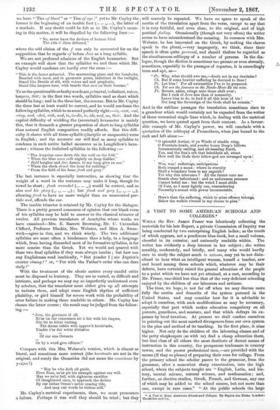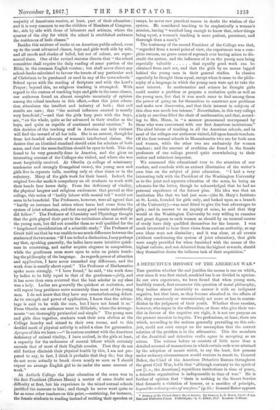A VISIT TO SOME AMERICAN SCHOOLS AND COLLEGES.*
Wau.e the Rev. James Fraser was laboriously collecting the materials for his late Report, a private Commission of Inquiry was being conducted by two enterprising English ladies ; as the result of which appears, not a ponderous blue-book, but a small volume, cheerful in its exterior, and eminently readable within. The writer has evidently a deep interest in her subject ; she writes sensibly, moderately, and briefly, and many who would hardly care to study the subject much in extenso, may yet be not disin- clined to hear what an intelligent woman, herself a teacher, saw and heard among those schools which, whatever may be their defects, have certainly raised the general education of the people to a point which we have not yet attained, at a cost, according to Mr. Fraser, one-third less than that of the very deficient schooling enjoyed by the children of our labourers and artizans.
The time, we hope, is not far off when we may discuss more fully the merits and demerits of the system pursued in the United States, and may consider how far it is advisable to adopt it ourselves, with such modifications as may be necessary, especially that part which makes education compulsory on all parents, guardians, and masters, and that which defrays its ex- penses by local taxation. At present we shall confine ourselves to pointing out the most marked divergences from our own system in the plan and method of its teaching. In the first place, it aims higher. Not only do the children of the labouring classes and of the petty shopkeepers (as with us) find a cheap education there, but that class of all others the most destitute of decent means of instruction in this country, the prosperous tradesmen in country towns, and the poorer professional men,—are provided with the means (if they so please) of preparing their sons for college. From the primary school the scholar passes to the grammar, from the grammar, after a somewhat sharp examination, into the high school, where the subjects taught are "English, Latin, and his- tory, mental science, natural science, and mathematics ; and, further, as elective studies, Greek, French, and German, any one of which may be added to the school course, but not more than one, except in rare cases." "At the public schools the large * A Pisa to Boma American Schools and Cala" By Sophia Jon Blake. London; Macolllign and Co. majority of Americans receive, at least, part of their education ; and it is very common to see the children of Members.of Congress, &c., aide by side with those of labourers and artizans, where the quarter of the city for which the school is established embraces the residences of both classes."
Besides this mixture of ranks at an American public school, even up to the most advanced classes, boys and girls work side by side, and all creeds and shades of belief, but not of colour, are repre- sented there. One of the revised statutes directs that "the school committee shall require the daily reading of some portion of the Bible, in the common English version ; but shall never direct any school-books calculated to favour the tenets of any particular sect of Christians to be purchased or used in any of the town schools." School opens with the reading of Scripture and with the Lord's Prayer ; beyond this, no religious teaching is attempted. With • regard to the custom of teaching boys and girls in the same classes, our authoress found an almost complete unanimity of opinion among the school teachers to this effect,—that this joint educa- tion stimulates the intellect and industry of both ; that evil results are rare ; that "the mutual influence exerted is usually very beneficial ;"—and that the girls keep pace with the boys, are, _" on the whole, quite as far advanced in their studies as the boys, and quite as capable of continued mental exertion." In this decision of the teaching staff in America our lady visitant will find the reward of all her toils. She is an earnest, though far from hot-headed advocate of woman's intellectual claims. She desires that an identical standard should exist for scholars of both sexes, and that the same facilities should be open to both. This she found to be very generally done in America, and she gives an interesting account of the Colleges she visited, and where she was most hospitably received. At Oberlin (a college of missionary tendencies and strongly Evangelical views), the young men and girls live in separate halls, meeting only at class times or in the refectory. Many of the girls work for their board. Indeed, the original founder made it compulsory on all students to work with their hands four hours daily. From the deficiency of vitality, the physical languor and religious excitement that prevail at this college, this union of "bodily labour with mental toil" would not seem to be beneficial. The Professors, however, were all agreed that "hardly an instance had arisen where harm bad come from the system of joint education, and that many good results undoubtedly did follow."- The Professor of Chemistry and Physiology thought that the girls played their part in the recitations almost as well as the young men; but did not eonsider them so well qualified for the "lengthened consideration of a scientific study." The Professor of Greek told me that be was unable to see much difference between the studentsof the two sexes. "If I am to find a distinction, 'may perhaps say that, speaking generally, the ladies have more intuitive quick- ness in construing, and earlier acquire elegance in composition, while the gentlemen seem more open to seize on points touch- ing the philosophy of the language. As regards power of attention and application, I have never remarked any difference, and the work done is usually about equal." The Professor of Mathematics spoke more strongly. "I have found," he said, "the work done by ladies to be fully equal to that of the gentlemen—fully, and it has more than once occurred that the best scholar in my class was a lady. Ladies are generally the quickest at recitation, and will repeat long problems more accurately than most of the young men. I do not know that they have any counterbalancing defect. As to strength and power of application, I know that the advan- tage is said to be with the men, but I have not found it so." From Oberlin our authoress went to Hillsdale, where the arrange- ments "are thoroughly patriarchal and simple." The young men and girls dine together, students wash their own clothes at the College laundry and attend to their own rooms, and to this decided mark of physical activity is added a class for gymnastics. Apropos of this we learn :—" In curious contrast with the American deficiency of animal vitality, I have noticed, in the girls at least, a capacity for the endurance of mental labour which certainly exceeds that of most of their English cousins. That they do not still further diminish their physical health by this, I am not pre- pared to say, in fact, I think it probable that they do ; but they do not seem actually to break down nearly so soon as I should expect an average English girl to do under the same amount of work."
At Antioch College the joint education of the sexes was to ' the first President' (Horace Mann) a matter of some doubt and difficulty at first, but his experience in the mixed normal schools justified the measure to him ; and though he never went quite so far as some other teachers on this point,—restricting, for instance, the female students to reading instead of reciting their speeches or essays, he never saw practical reason to doubt the wisdom of the system. He considered teaching to be emphatically a woman's mission, having "watched long enough to know that, other things being equal, a woman's teaching is more patient, persistent, and thorough than a man's."
The testimony of the second President of the College was that, "regarded from a moral point of view, the experiment was a com- plete success, no grave cause of reproach ever having arisen to dis- credit the system, and the influence of it on the young men being
especially valuable that equally good work can be obtained from each sex, and that the girls by no means lagged behind the young men in their general studies. In classics especially he thought them equal, except when it came to the philo- sophy of a language in which the young men were apt to take the most interest. In mathematics and science he thought girls could master a problem or prepare a recitation quite as well as the young men, but that it was much rarer to find among them the power of going on for themselves to construct new problems and make new discoveries, and that their interest in subjects of this class was much less intense." Nevertheless, in this very college a lady at one time filled the chair of mathematics, and that, accord- ing to Mrs. Mann, in "a manner pronounced unsurpassed by those who were conversant with our first American institutions." The chief labour of teaching in all the American schools, and in most of the colleges our authoress visited, fell upon female teachers. Of the four normal schools in Massachusetts two are for both men and women, while the other two are exclusively for women teachers ; and the amount of erudition she found in the female professors of one college proved quite overwhelming to their visitor and volunteer inspector.
We commend this educational tour to the attention of our readers, and conclude with an extract illustrative of the writer's- own bias on the subject of joint education. "I had a very interesting talk with the President of the Washington University as to the joint and separate education of the sexes, he being an advocate for the latter, though he acknowledged that he had no personal experience of the former plan. His idea was that an. institution like that we had just seen—(the St. Mary's Institute at St. Louis, founded for girls only, and looked upon as a branch of the University)—was most fitted to give the best .advantages to, girls ; and in answer to an inquiry of mine, he said that they would at the Washington University be very willing to examine and grant degrees to such women as should by an unusual course of study have duly qualified themselves for the honour. I was much interested to hear these views from such an authority, as my own ideas were not dissimilar; and it was clear, at all events (without condemning the system of joint education), that girls were amply provided for when furnished with the means of the highest culture, and not debarred from the highest rewards, should they themselves desire the toilsome task of their acquisition."































 Previous page
Previous page